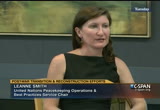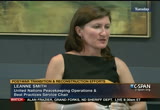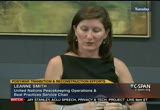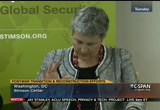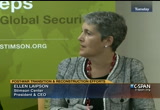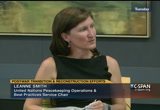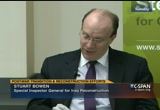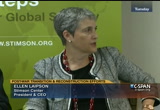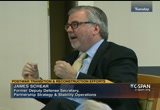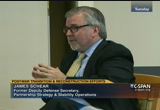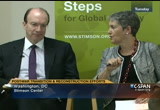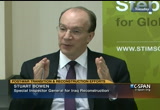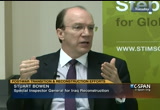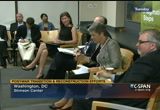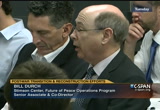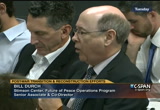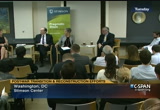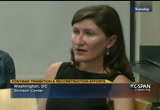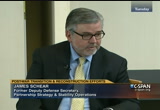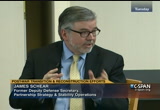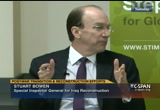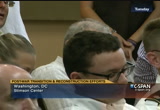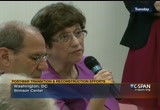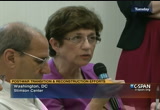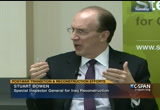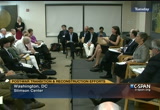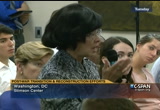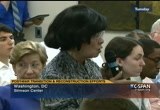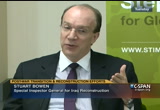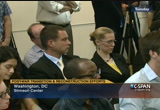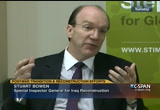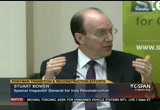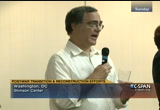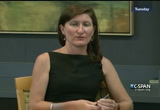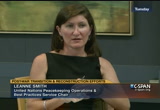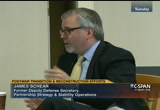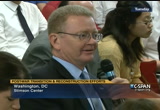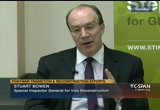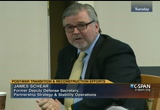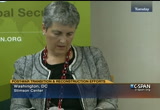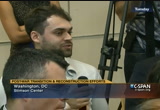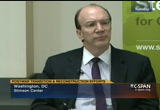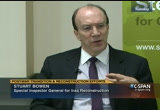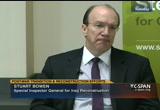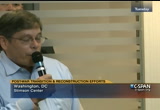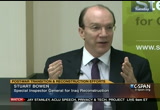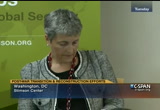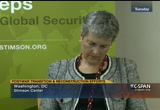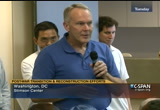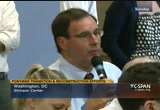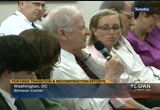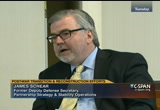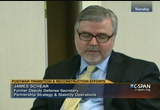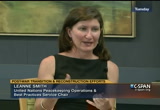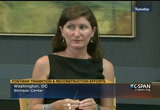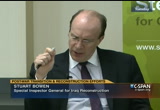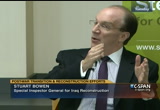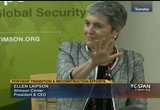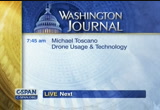tv Capitol Hill Hearings CSPAN August 14, 2013 6:00am-7:01am EDT
6:00 am
of other aspects for the policy that maybe interesting for this discussion. something we're working on heavily now is the value of benchmarking. how much can you get out of benchmarking? how rigorous is that of a process? what do you do with a set of benchmarks that are not achievable in the political time frame you have? how do you make sure you can bring those together? we're also doing a lot of work on public perception surveys. bench marking as a quantitative measure. how does your average afghan province feel about related to that benchmarking is mapping the work we are doing. it is amazing how often we don't know what our staff are doing and how much time it takes for them to do it and who they are working with.
6:01 am
we don't always have a clear sense of what this means and what tasks they have and what capacity they have to pick up those tests and whether they are in the government or in the u.s. country with other partners like bilaterals. we are focusing on that right now. another thing that is difficult to do is to know what will happen after we transition out of a place. we spent the last few years assuming the peacekeeping mission would leave and the un political mission would take over. there was a change of government there before the transition was due to happen and we found there will not be any security council role or political mission. un presence. we could have done a better job of doing contingency planning around the scenario that was going to follow from us on that is what we are working on at the moment, as well. the last thing i should mention to this audience is how do we at maintaining both
6:02 am
the political and the financial support for a country we have in after we go. for peacekeepers, we bring the lens of the security council which tends to bring a lot of money with it. once the count -- once the country is off the council's agenda, it slips dramatically and there is less money and less staff to finish a very big job we did not get around to finishing. those of the kind of issues we have been addressing. i would be happy to answer any questions. >> thank you so much. those are three really fascinating presentations. i will take the liberty opposing a quick wetjen to each of the three speakers and then i will on themill dirkesen the floor will be open to your questions. this resonates how these issues get debated in the united states -- exit strategies -- we talk about if there is one and the
6:03 am
u.s. military wants to know how long is the commitment at the beginning. but the flipside of that is worrying about too much public communication about our own exit plan because them the bad guys just wait us out. the bad guys know they only have to be patient for another 12 months and then the field will be open to them again. this is an argument that has been made in afghanistan and was made in iraq, too, in our own political discourse. the party out of power loves to scold the party in power for talking too much about the endgame, thinking it is exposing a vulnerability. could you talk -- you linked communication strategies and the notion that the un does have to set a finite date to its engagement. does the un also worry about even talking about exits -- can they exacerbate the situation on the ground? >> we don't talk about exits.
6:04 am
the language is language we have decided not to use. the work we are in doing is reconfiguring our presence on the ground. it might be cheeky to talk about it that way but we don't talk about the exit of the peacekeeping mission. we talk about the reconfiguration of the un presence. wille same way, maybe you have a significant military drawdown from the u.s. but a continued u.s. military presence in the country. or us, maybe the military peacekeepers will leave but the us will have been on the ground probably before have and will be on the ground afterwards. it is a different way of communicating that message. you cannot avoid the realities. >> would you like to comment on that issue? >> the first is planning for departure. you cannotin u.s. military parlt
6:05 am
does success look like? the iraqe reasons that reconstruction program lasted years almost was that we did not have a plan that looked that far down the road. that fellchmarks victim to political realities. providing integration and responsibility in one office would assigned the duty of thinking about that very important question so that we 12-yearve reconstruction operations. you are spot on with all five and i think number one is properly put first because you have to be in sync about the end before it even starts, before the first foot lands on the
6:06 am
country that is being aided. >> thank you. i have a slightly different question for you, jim. you have been in the learning part of the defense community come of the national defense university institute for strategic studies. policy action oriented job so we gathered these smart people to do these reflections on lessons learned but then when the reality hits and these deployments are six-month turnovers, people are in the field for short periods of time, what is your sense of -- are the right people learning or do the scholars learn and the action folks have to get the cliff notes version of the learning? how much of these insights actually get absorbed by the people being deployed for short tourrs? >> fascinating question. importance of
6:07 am
lifelong learning of practitioner education, as one goes forward through a career, doolars and the policy world live differently. they think differently. i recall long ago by walden pond, henry david thoreau lamenting we have become tools of error tools. you have to understand how tools work in washington and downrange. in stewart's world, legal authorities, funding, how to work effectively in an interagency domain, what can we tong together - you have cast the net widely and this is the challenge for the stabilization community. you need to be inclusive. everyone needs to be in the room. that can create a little bit of angst at senior levels if it is a delicate issue where the future direct and is not clear.
6:08 am
the human resources, i think, is hugely significant. i do think that's at various phases of a career, management capacity and the ability to andrstand who knows what who brings what to the table can be very helpful especially the country team level. generals don't report to ambassadors but ambassadors are the leading voice. coordination is absolutely required. having the country team with the right level of skills and capabilities -- it worked quite well in a country like columbia at various points in time for example, is really vital. i would not accept there is going to be inevitable differences between scholars and practitioners but they have to work together. that is a challenge. >> before we open it up, i
6:09 am
wanted to ask you to comment it little bit on the cost implications of your proposals. you have spent a decade now worrying about how the taxpayers money is being spent. did we waste money? did we spend it on the wrong things, etc? can you tell us whether you consider the costing implications? are you talking about bricks and mortar new building agencies and where it would sit in the process? with the defense and state departments no longer do things so that soco would be the magnetic pull of where that resides? new offices, as logical as it sounds, is that it does not necessarily compel the other parts of the system to stop doing what they already do. i want to ask you about cost and efficiency considerations. >> great question, thank you. yes, we thought about this carefully.
6:10 am
is ad, in the bill, there version that ensures that it is budget neutral. small toses relatively what the office would achieve -- $25 million per year, anticipating 125 employees. it would be scalable. iswould be -- scalability critical to carrying out these missions. it would sit as an independent office reporting to secretary of state and secretary of and thent like the cea marshall plan which is a precedent. it is also my reporting chain and it worked fine and i think it grasps the current reality about stabilization reconstruction operations, that they are civ-mil. that is certainly a lesson from afghanistan and iraq. that answers the question of
6:11 am
costing and structure. itr third point -- how does resolve the integration question and coordination? is it a layering of bureaucracy? no, there are five different offices. in five different stove piped agencies that are carrying out five different aspects of this operation yet no one is bringing it together before the operation begins. to depend on the serendipitous confluence of favorable personalities that occurred with general petraeus and ambassador crocker is not a strategy. serendipity is not a strategy. we need planning. eisenhower said planning is everything. the process gets you to resilience, gets you to clarity and ultimately gets you to victory in these operations and keep them short. it would ensure that we would not have this constant turnover in personnel which contributed
6:12 am
to the length of the operation. really not staying longer than one year. usoco would and the analogy would be like fema which has its mission declared. il capacity and jurisdictional capacity and has already prepared with analyzing what the situation might be and therefore, when it engages, there is not the long ramp up like we saw in iraq where it you saw freefalling. that is unacceptable. we can do better. i think we will. >> i would like to invite my dirch.ue bill any comment? >> a couple of comments and
6:13 am
queries, thank you. --ee excellent presentations there is always tensions, we find, between the need for rapid action in the aftermath of conflict and the long-term need to build new post-political culture that is more conducive to non-violent politics than the ones it replaces. part of the problem is the sheer difficulty of pulling up a damaged or fragile state and balancing local priorities against the history of mayhem. my first question is to leann - -- un policy balances reflecting national priorities with a very specific caution to adapt to unforeseen security setbacks. is -- what if the security setbacks are a function of national policy and how do you deal with that?
6:14 am
the second observation has to do with the civil military question in the field. just as the un military in the field answers to civilian authority in complex operations tom and it has for 20 years, un military forces are capacity on loan for the un. they are not the heart and guts of the un foreign policy for international engagement. u.s. military forces are. they are much more central to the un presence -- the u.s. presence and action. conflict affected areas. my question is for jim and stewart -- how does the difference in the status of the element as a defining of the institution, the country, make it harder or easier for us to engage and to be flexible in our engagement? thanks very much for that question.
6:15 am
when a peacekeeping operation goes into a country by the un security counsel with the additions on the and the way circumstances evolve -- i mentioned sudan and the work being done by the mission there set up benchmarks around phases of the mission based on what the mission has been asked to do -- as soon as negotiations between north and south breakdown and the oil stops running and the economy falls apart, so many of the aspects of the benchmarks we are looking at just stopped working. it is our job to report back to the security council and say this is what we were planning to do and this is what happen and we can keep going or we can slow down and recognize the circumstances and it would be our preference to sit tight until the conditions are right. it will always be a political solution and i financial decision by the member state to fund the peacekeeping presence
6:16 am
there. in a related point -- in addition to these policies, we have been working on what we call an early peace building strategy for peacekeeping. the number one reason that peacekeeping get sent to a place is to stabilize and bring peace and security and create an environment for broader peace building goals. we realize what we do is peace building activities so we developed a strategy the last two years that looks at how we allocate the jigsaw puzzle more broadly and it is around three rolls of peacekeepers. the first is because of our political role with the council to articulate what the peace building goals for the country are and help the government we are in articulate the goals they have. the second is by the security umbra we provide through a un military policing to create enabling and firemen for other actors to have the to come in and do some of those peace building work and get that work started. the third aspect of the early peace building strategy are the
6:17 am
few roles of civilians that are peace building jobs, working in rule of law with the court with corrections or working with the human rights institutions. that is early peace building work and that is part of the stuff we need to transition over to other actors. another question and then we will open it up. >> very good question and a difficult one to wrestle with , iwhen u.s. forces go in generally take the view that they are seen as what i would call partisan peacekeepers. the u.s. is generally not there to be neutral and impartial. it is there to support. it is there to exercise ideally in a, positive direction, toward capacity building. national capacity development, in fact, is a critical issue in
6:18 am
our transition in afghanistan. taliban will not win by waiting. they will be dealing with a national force which may have legitimacy which is our desire the outcome. when we come in his partisan pique peacekeepers, we have magnetic qualities. we attract some and repel some and when we some maybe for the wrong reasons -- we have to be careful about that. we recognize that. the issue is -- are we dealing not havelers who may any public support within their community despite the revolutionary united front in sierra leone and the british knew that, by the way. or is there a deep set insurgency reflecting an app note-sectarian split within a country.
6:19 am
we have to be conscious of the terrain. we go in with focused concern because we generally are seen as partners. >> i concur totally. with regard to civ-mil, civilians must leave the operations. usoco would ensure that and there is a big debate in iraq. 75% of the rebuilding contracts contract with the policy does -- assigned to the state department. that created an insoluble, it it resolvable dichotomy between policy oversight and contract execution. ise mil piece at the outset aimed at rule of law and that would miss to a certain extent, or a substantial extent, early on in iraq and part of the cause of our policy move from liberate
6:20 am
and leave, the prewar plan, to occupy and rebuild, the quick postwar plan that we adopted that we were not systemically capable of executing. >> the floor is open. stanley, the next to the last row. in 1812, napoleon invaded russia. he occupied moscow. things did not go to well after that. he get the post- conflict stabilization wrong or did he simply misunderstand the nature of the war he had initiated? [laughter] exceeding my scope of historical understanding here on this. it would not be the first time ashore,ry that we went involve the international community, and there were unexpected perceptions.
6:21 am
i recall vividly in 2006 number a general officer turning to me in the iraq he context and saying when we went ashore, we thought we would be seen as the lewis and clark expedition and we were seen as the vikings. local perceptions count a great deal. >> colleen baker. >> i am from the fund for peace. i want to adjust the political context in which all these lessons learned are being addressed. it seems there are two contradictory trends going on -- internationally, there seems to be growing political will of of coordinated effort to solve these problems and get in. r2p, the new un
6:22 am
mandate and the congo which is the first time a mandate has been given to have offense of operations which are normal peacekeeping operations, yet, in the united states, the political will is going in the opposite directions. we've got sequestration. i don't know what kind of sick -- support you have gotten on this bill but i think there would be sympathetic skepticism in terms of doing anything new in anticipation of another operation and certainly not another operation on the scale of afghanistan and iraq. the question is -- how did these two political directions mesh? can the international efforts, not just the un but regional --anizations like an apricot like in africa, if the u.s. pulls back are these kinds of new initiatives and needs and lessons learning we are talking about, does it have any chance at all in moving us forward on this issue? if the u.s. pulls back, does -- how critical is the u.s. support to these kind of operations? >> great question.
6:23 am
would provide support on a multilateral level. there is planning goin minister from syria is leading un effort for a post- conflict relief and reconstruction activity as is identifying areas that needs tens of billions of dollars of aid. yet, it is wanting for a u.s. connection on that point. there is no existing center of gravity of responsibility to which he could connect. it is scattered across the interagency. a hope is not a strategy. the goal of reform is to provide the president options with regard to how the country might respond to a variety of that would require
6:24 am
stabilization and reconstruction and help. right now, his options are limited. we don't have a fleshed out planning process or integrated capacity for carrying out these missions. >> [indiscernible] that would require stabilization and reconstruction and help. does congress adopt that logic? >> there is a positive response in the house and the senate to the identification of the problem, interest in the solution but recognition of the reality of passing a bill as ambitious as this -- there is work being done on it. , favorablyresponsive responsive to the problem itself. >> did you want to comment on outthe u.s. role pullsdoes cont >> i think the two things you pointed out are related to each other and the way the international community is looking for new tools to address emerging situations and new places is quite frankly related
6:25 am
to the u.s. position. it is also related to the global financial crisis and impact on countries in the eu. it is also about emerging partner so the applicant union and the sub aboriginal organizations are keen and willing and capable of playing a bigger role in some of these scenarios. i think they are all connected to each other. the important thing is to make sure we are context specific of what's applies to that scenario. some have more legitimacy in some places than others. >> the next question is from the aisle here. then i have charlie stephenson next. i appreciate the discussion. if you can discuss basic problem stash - maybe there is propaganda groups so unless we face the basic problem, you have to support
6:26 am
those who will tell you that there is true then we can have real reform. we did not address these issues and we diverted resources a. resources are used and maybe they use parallel issues. there are facilities in afghanistan after you build them with millions of dollars and now you want to retreat. they build and they depend on giving it to a few private interest groups. if you can address accountability issues, resources, and [indiscernible] and where there is a appointment of petitions.
6:27 am
want shepherding the people and nobody knows what is where. i wondered if you can adjust these issues, the basics, so we can move forward from the basic level of accountability. the core point is correct that we need more transparency and accountability in stabilization operation construction. from a rack, at least $8 billion was wasted. another $300 million was recovered from fraud investigations. there will be some fraud and some waste inevitably. we need to study that issue before we get in more acutely but we need to reform our approach to reduce the level of fraud, waste, and abuse in these operations. with regard to the interest group issued -- this is not one that has a particular interest group behind it. another $300 million was recovered from fraud investigations.
6:28 am
it is bipartisan as reflected by the sponsorship and there is bipartisan interest on the hill. whether that translates into passage remains to be seen. >> charlie stephenson next? >> i want to pick up onjim schear's point that maybe senior leaders would be reluctant to make use of this office because of the fear of leaks or unresolved policy disputes over what the situation was. let's assume the office exists today -- what would you recommend and think it could accomplish, say, for syria and egypt? what should they be doing today for those two issues and how likely do you think senior leaders would be likely to say go do it? said, toneral petraeus succeed in a stabilization reconstruction operation, you have to be absolutely completely conversant in the economies of it is bipartisan as reflected by thepolitics, the history, the
6:29 am
society, the needs, the real needs of the object countries. that was not the case in iraq nor was it the case in afghanistan. the iraqi interviews failing to consult sufficiently about those nays. would have fully engaged in those issues in preparing for a syria-based operation. suspicions about generals or ambassadors, i think it would be incumbent on the director to make their that usoco was additive. it would help them accomplish missions, relieve them of duties outside their defense or diplomatic roles. so that they could focus on those, the defense ensuring rule of law, the diplomacy ensuring
6:30 am
the establishment of democracy and sovereignty and part grass in the political sphere as the country recovers from failure and moves toward stability. point washt jim's different -- does it create an inevitability into acting. can you do this without pre- decision or does the planning create some momentum? that might have been the point. militaryintain a large but by maintaining it, we don't resume we want to use it in an aggressive fashion. we maintain it so the president has options with regard to national security policies. planning, structuring capacities is not necessitate its actual use. >> gentle man in the yellow shirt. >> good to see you again.
6:31 am
building on what was said before -- this proposal has to be broadened out to have any legs with a source of parameters of the inter-i agency office could actually do. as you suggested, there is any number roles it could do if the focus is on its planning and activities when there is a large in a foreignation country. i don't see how in this environment it would move forward. as you think about how you pitch this in various audiences, you should think about how he would talk about those various different responsibilities. theestion for leann- contribution of troops in countries -- because of restrictions on the troops of the contributing countries. as an operation moves through its different phases, how do you deal with liaising with the
6:32 am
troop -- contributing countries to make sure they are comfortable with the changing operations, particularly in a fast-moving environment like south sudan and come in for stability along the border and then there is a potential mass atrocity event. how do you get the host countries to step up to new responsibilities that come forward in a rapid fashion without the security council thinking through how they will execute on the new mission? sorry for the long comment. >> either of you want to comment? the million dollar question -- we're absolutely right -- are facing new mandates from the security council. i would point to the new resolution 2098 as an example of that. the evolution of peacekeeping over time since the early 90s
6:33 am
has gone from having a bunch of western concerto that are members to contributing troops to a big shift where many countries from the developing world are major contributors and what will happen next? we hear rumblings from european countries about every turn to blue helmeted peacekeeping operations. we are working on a strategy of trying to expand the basic peace keepers and try to identify where the problems have been and why some countries have moved away from peacekeeping and what we to do to incentivize bringing new countries in. working on developing a set of un capability standards across the full range of functions. so countries feel comfortable about what they need to contribute and what will be expected of them when they do contribute. it is definitely a work in progress and we will see how things pan out with these new operations in india. what we are seeing globally
6:34 am
is a movement toward regional responsibility. we can call it a distributed model, if you will, for security -- theook in haiti extent to which western hemisphere countries has stepped up his impressive. quite frankly, we know more how to promote stability and peace than we would. i give them a lot of credit. this new intervention force and drc will broadly be from the region. the jury is out as to how it will work but also in the horn of africa, largely a regional effort. the u.s. focus in these areas is to enable and promote this area with partnered operations. training and assisting on training and enabling and some advising pursuant to law and
6:35 am
direction from the president. it will be a light footprint. it will be to enable partners and various regions to work effectively. -- the extent to which western hemispheresomalia is a currentg example. >> in the front here -- >> thank you. quick question to stuart bowen -- one of the success stories of vietnam, perhaps one of the few of doherty had the to act and it worked quite well. could you touch on that? if jim, the question is -- we had all the expertise for stability operations, how does dod plan to maintain it? will it be through you?
6:36 am
the 10th mountain used to be rpc ping effort, will that do the specific training for the future and will it coordinate with the un in the future? right, cords is a precursor to what is effective operations and because of the strong leadership from ambassador comer, it has a great legacy. it was somewhat replicated where there was strong leadership in iraq with reconstruction. it brought military and civilian members together to meet local oversee andoperly was probably lead and made a difference for the good and that is true also in afghanistan. i think,hose aspects, are part of the ancestry for the usioco idea.
6:37 am
when properly led anticipated usoco. it would ensure that properly should exist before the next operation begins and proper training is a compass before it starts and ensure that these entities of capacity that executes the stabilization reconstruction operations are researched. -- doug, a quick response there will continue to be expertise in pockets of strong comparative knowledge about this mission set which will persist. would recall that in the 2000 presidential election, the 10th mountain took a little bit of heat from the george w. bush campaign for not being prepared to wage traditional conflict because of its bulk and deployments and task forces. typically would
6:38 am
be the most likely vehicle. also, in the professional military education feel, absolutely correct -- the peacekeeping stabilization , the u.s.institute army war college, the national defense university -- they will continue to be pockets of expertise on which we can draw. need for goode comparative knowledge. one of the biggest challenges we -- we always have is that people over-generalize. it does not always work in one place the same as another. >> i have six people so far and there may be a few others and we will try to fit you all in. the gentle man and the last row? i am here from a study at georgetown university. is about broadening
6:39 am
our lens for tools for transition. a conflict was the first reaction from the united states 30 or 40 years ago when the european union started working and building up the institutions for common security and defense policy. there seems to be a slight change of the discussion about building up institutions for a inil -- military institution europe and even in the wake of integration of the u.s. in 1991. there was the petersburg task where the european union decided that its work on civil military integration. what extent he also consider the institutions the european civilhas built up for military integration and the conflict management in your
6:40 am
research? >> i think the stabilization ait of the united kingdom is good example of responding to this contemporary challenge. that has sought to bring together him civilian and military components within the to be able toand execute that capacity in these settings. it is much smaller by definition and scale but is aiming in the same direction. other member states in the eu are similarly responding. to some extent, they are looking for us to respond in an integrated fashion. -- in the back thank you for your persistence. we have been working at the say long time and thank you for your skepticism, jim. i want to drill down on the
6:41 am
realities of this. i think you have outlined everything very clearly over the years about what needs to be done. who is thee is -- leadership on this, not only on the congressional side emma but in the loss leaders in this field? we all know about this. this does not have resonance in standard campaigns or among foreign policy. of whatgs that resonate you do an oversight where people want to know where dollars go and they see this as a challenge. perspective. this is prevention, in some ways, this is planning. i don't see how the campaign, which this is -- and you have been running for quite some time -- is reaching people who need to do it. before vice president was in the -- biden was involved, i don't see on the appropriations committee or anyone else who was there. -- haveorts of
6:42 am
continued to talk about the dysfunction of congress not only about reconstruction. downlly want you to jail on what the reality of doing this is. people support these initiatives on all levels but they don't see how this will happen in this climate when it is needed. -- rate question lindsey graham was enthusiastically supported and other members of the armed services commence in dish commission -- commission were similarly so. are senators like joe mansion who are committed. they are not terribly visible yet but there is substantial
6:43 am
support with a bipartisan interest. leadera better salt than ryan crocker? he is the returning dean at the bush school. lead thetinuing to public discussion about this crucial issue. atilarly, ambassador hertz the center of complex operations and a number of people at ndu are interested in this. there is discussion and -- on the on the help hill with them the public and private academic communities by those most familiar with the subject. their general response has been positive. >> it strikes me that this
6:44 am
feels like the civilians fighting the last war. we are building a hammer that would apply to the last words at a time when we don't expect the mac stores to look like those. the energy and investment that seems to be going toward the usoco innovation seems to be the wrong place to put the energy when, in the future, we will hopefully not be doing these occupations and reconstructions with the dominance of the united states. what we need to figure out how to invest is to invest in some kind of more multilateral that makesategy other kinds of institutional changes in the way we go about this. if we convey to our congressional leadership that the best way to do it is just do it better job of what we did it iraq and afghanistan, we are giving them the wrong lessons. ofould question the value dressing that direction for
6:45 am
these efforts, not that the lessons cannot teach us things, but institutionally, it critical we change our course. >> i 3 -- the status quo is unacceptable and usoco is not a presumption that we will have another iraq or afghanistan. were becauses they we did not have integrated planning or capacity or effective oversight. that is why they lasted so long. i would urge that we will avert a future iraq and afghanistan but more effective integration because the operations will be more successful. rather than being nine or 12 years long, they will be much shorter and we can have a vision expectatione -- an of what success looks like by ensuring that somebody has this mission as their primary duty, not as there are additional duty which is currently the case across the interagency.
6:46 am
it is not the primary duty of any agency. when it comes to execution, they have been focused on their primary duty until suddenly called upon to respond and they have been resourced sufficiently so they don't have planning in place and the resources are not there so you wind up staying too long. it is too expensive in blood and treasure. >> i will invite a few people to ask questions and then we will invite our spigot to make their final comments. our panelistsite to make their final comments. questionerser of have cited the inherent complexity of these operations. office affect the inherently complex and difficult
6:47 am
lyrical strategic questions on areh most of these missions founded. for example, the decision to de-thatthe iraqi army, the vacation, create a division and make possible a peace agreement and let the serbs stay in them north, the situation in rwanda and touching off an african world war and the situation in congo? these are difficult, political questions -- how does your effort affected that? >> great question. >> let's hold that thought. >> thank you. -- thetion goes to subject has gotten far too little discussion and that is -- how difficult it is to do capacity building whatever that
6:48 am
means? would use the case of haiti where we have been building capacity for many years and there is still not much there. some of the exercises in africa may be the same. how can we do that lesson learning better and what progress has been made? >> the woman in the back row? thank you very much, there was a couple of serious concerns of an organizational nature. mr. bowen toto get address this. usoco would complex of five the chain of command because it would be an institutional orphan. ofwould allow other agencies
6:49 am
government to outsource responsibilities for stabilization operations. i think that is a concern that usoco was true of an earlier version of usoco. i would like to ask mr. bowen to relate -- how does usoco to the decision-making process and specifically the national security council and does that adequately address the concerns that dr. sdchear raises? my question tracks along with an earlier point. basist of the fundamental of what you are talking about which is planning for the exit from the beginning, looking to get in and get out quickly -- i would hold that that is the wrong approach. once you start thinking that you have to plan to leave from the
6:50 am
beginning and your focus is leaving on too soon and rather than focusing on the exit so quickly, you are missing the opportunity to get things right. i would say we have made mistakes of planning to leave too soon, having to short-term division over and over. i would wonder if that has played into your thinking at all. >> the last question in the front row? since egypt will settle its own thing with some diplomatic helped by us and syria is hopeless -- the next country is yemen. past,e occasions and the i asked the judge and generals to tell me about their experience and they would not talk to me. should we go into yemen? [laughter]
6:51 am
i will invite all three speakers to take two minutes to pick whatever themes you heard and respond. going to step up on that particular question. [laughter] there is a lot of great input from around the room. a quick comment -- i am very sympathetic to the point that david makes. soon,ms of leaving too that can be a big challenge. i would offer that as part of our sro reform effort, when we look at transitions, we need to do what i would call stressed test planning. we need to look at these different multidimensional transitions and where are we going to have a problem in
6:52 am
conveying responsibility, authority -- responsibility to a host nation. it is part of the capacity building issue that margaret raised as well. ande will be cultural capacity differences. see that in casualty evacuations in afghanistan. we have to go through each of these transitions from tactical level training and equipping to ministerial level development, from laws of armed conflict approach to law enforcement impact,, too quick stabilization assistance, the longer-term development -- all of these things require concerted forward-looking planning. i think that is really important. finally, i agree with the about nss needs to
6:53 am
step up to this. that is very important and that is critical, thank you. >>leanne? >> on national capacity development and planning from the beginning -- one of the hardest things we have to struggle with -- the main problem i see is that we are putting the wrong people into capacity development jobs. i was an international lawyer doing development capacity programs in the foreign ministry and i had no skill sets. i may have been a technical expert and that area but i did not know how to work with an older afghan man who had been in the foreign service for 20 years who had to listen to a young australian woman to do his job. we need to be trained to build capacity and we have to care about building capacity, not just getting the job done. once we have built that capacity, how do we keep it there? if you are a young afghan and
6:54 am
you are good enough and there are enough of you that the international community wants to pay you a higher salary, why would you stay in international service? we need infrastructure incentives on salaries. to exit from the beginning point, the way you cast it is right -- we should not land on exit based on what we know the realities of political interest and financial ability to be there but it is our job in peacekeeping to be planning what it will take to implement the mandate we been given. if that is less about exit more about benchmarking achievements toward the end state of what we want to do there, i think that a slightly different than planning to exit from the beginning. it is planning on what we are doing while we are there. >> on the complexity strategic decision --usoco would strengthen them. on march 10, two thousand three,
6:55 am
the president decided the iraqi army would be use postwar as a ribald enforce. , not dissolved. would bethification dissolved. existed, there would have been continuity and continuity equals strength and success in these kinds of operations. capacity building is a huge question and we spent over $7 billion on it in a rack. what did we get for it? impossible to answer. part of the challenges that we did not focus on it effectively on exactly what the iraqis needed. anticorruption capacity, very little spent in that area, usoco would have ensured that that would happen before the operations began. i thewould not complex if chain of command. it would fill in an empty space. it would make clear who is in charge of planning for and
6:56 am
executing relief and reconstruction activities. the interagency management system, what was set up within of nsc to run these kind questions for iraq and afghanistan did not really succeed because it was in itself an ad hoc aristocracy of the iraq program. agree that you don't pick an exit date and you don't identify what you think it should be but you envision what success looks like. it is another way of describing benchmarking. called ahieve what was conditions-based a partridge decisions, you have a sense of how -- departure decisions, you sent -- you have a sense of how it works. pre--operation planning which is everything, i think, to success of the execution and oversight. if you don't, as david petraeus
6:57 am
said, engage in deep understanding of the society, the economy, the politics, the history, the secretary and issues to be specific about iraq -- then your execution is going to be on an ad hoc basis and you will not have what success looks like come into view soon enough. >> unfortunately, we have run out of time and i can link the yemen question and the important point - we have been talking about tools , functional processes and skill sets that are needed but those hard policy choices of what happens in very messy and unpredictable and unstable political and firemen's -- that is really happening by a different part of the government system so the decision of whether yemen matters enough for us or whether it is something that perhaps the un or some other group of countries might best engage on really isn't
6:58 am
equally compelling art but not the topic of today's discussion. i want to thank you all for coming and in particular, a warm comingo leanne smith from new york and giving a fascinating human perspective. george bolan, we thank you for your perspective. we look forward to seeing what happens next for you and jim, i thank you very much for ringing an important perspective to this discussion. thank you. [applause] [captions copyright national cable satellite corp. 2013] (202) 737-0001 journal@c- span.org journal@c-span.org journal@c-span.org journal@c- span.org journal@c-span.org ♪ [captioning performed by national captioning institute] [captioning performed by national captioning institute]
6:59 am
>> coming up live today," washington journal." we will talk about operations in theanistan and admin, sister of president obama speaks at the center for american progress. on ? "up this morning washington journal" we are live at the washington convention unmannedout the vehicle operations. then we talk to the president of the association about the types of domestic drones and how they are used and federal oversight. at 8:00 -- at eight there he
7:00 am
a.m. eastern, we will talk to an assistant professor of aviation. 9:00 a.m. eastern, a senior policy analyst for the aclu speech, privacy, and technology project. is next.ton journal good morning. "washington journal" on august 14. drones will be the topic of discussion today. in this program not only will you hear from law-enforcement, you will also hear from privacy advocates as well. as we go about the morning talking about the topic, we start off to hear your thoughts on the use of them domestically here in thete
56 Views
IN COLLECTIONS
CSPAN Television Archive
Television Archive  Television Archive News Search Service
Television Archive News Search Service 
Uploaded by TV Archive on

 Live Music Archive
Live Music Archive Librivox Free Audio
Librivox Free Audio Metropolitan Museum
Metropolitan Museum Cleveland Museum of Art
Cleveland Museum of Art Internet Arcade
Internet Arcade Console Living Room
Console Living Room Books to Borrow
Books to Borrow Open Library
Open Library TV News
TV News Understanding 9/11
Understanding 9/11